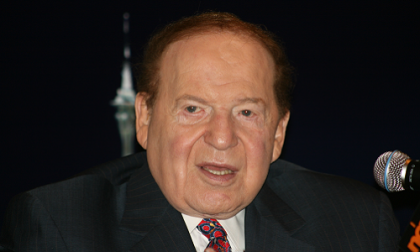Pro-RAWA Letter Circulating Amongst Attorneys General
The Anti-Online Poker Crime Fighting Super Heroes are at it again. On October 19th, Missouri’s Attorney General Chris Koster and South Carolina’s Attorney General Alan Wilson sent a letter to their counterparts around the United States, imploring them to hop onboard Sheldon Adelson’s coattails and support the Restoration of American’s Wire Act (RAWA).
The letter is a two-fer, actually, as the first part is the appeal to the Attorneys General, while the second part is the attached communication that will be sent to the heads of the House and Senate Judiciary Committees. Specifically, the intended recipients are:
Representative Bob Goodlatte, House of Representatives Judiciary Committee Chairman
Representative John Conyers, House of Representatives Judiciary Committee Ranking Member
Senator Chuck Grassley, Senate Judiciary Committee Chairman
Senator Patrick Leahy, Senate Judiciary Committee Ranking Member
In the draft letter to the members of Congress, which is dated October 30th, the deadline for Attorneys General to sign, Koster and Wilson explain that in 2011 the Department of Justice’s Office of Legal Counsel adjusted its interpretation of the Wire Act, saying it only makes sports betting over wire transmissions (and thus the internet) illegal, not all forms of gambling. Of course, as RAWA supporters tend to do, they framed it as if a legal interpretation must be correct if it was held for many years.
And then the magic begins, with the usual fearmongering:
DOJ’s revised interpretation of the Wire Act opened the door to expansive Internet gambling and has had significant negative impacts on our states from money laundering to exploitation of children to helping finance terrorist organizations. Additionally, the expansion of online gambling has undermined state and local law enforcement efforts to outlaw gambling which is prohibited in many states. As such, we urge Congress to adopt the Restoration of America’s Wire Act.
Never mind that they have no evidence to support such horrors as child exploitation and terrorist financing.
One of the more baffling paragraphs is this in which the authors claim that New Jersey’s online gambling regulation has been ineffective:
As predicted, regulation of online gambling has proven difficult for states. This June, New Jersey announced it would not prosecute illegal gambling sites that have been operating in the state since 2013, provided the companies cease business within the next five months. Given the inherently interstate nature of Internet gambling transactions, we anticipate that it will become increasingly difficult to effectively regulate such conduct as additional jurisdictions consider legalizing Internet gambling.
Either the Attorneys General don’t understand the New Jersey Division of Gaming Enforcement’s (DGE) decision or they are purposely failing to be honest about it. The amnesty was given to online gambling affiliates, not actual gambling sites. The decision was made essentially because DGE Director David Rebuck understood that the legal status of online poker was a gray area post-UIGEA and therefore took the “no harm, no foul” approach to the affiliates as long as they stopped promoting unlicensed sites by around November. That the affiliates complied and online gambling networks such as the Winning Poker Network and the Merge Gaming Network withdrew from New Jersey is evidence that the regulations actually worked.
The letter concludes with the theory (with which this writer does not totally disagree) that “Internet gambling is inherently interstate in nature” and therefore should be governed by the federal government and not the individual states. Part of the reasoning given, though, is laughable. “….states are ill-equipped to enforce gambling laws against interstate and international companies,” the letter reads, “particularly when age and location verification mechanisms are subject to compromise and the technological vulnerabilities of the Internet.”
Conveniently ignored are the successes with age and location verification in New Jersey, Delaware, and Nevada.
Koster and Wilson have tried this before. Last January, they teamed up with Nebraska AG Jon Bruning to make a similar appeal to Congress. That letter was actually written by Sheldon Adelson’s people and presented to Republican Attorneys General in November 2013. At that point, RAWA had yet to make its way to Washington, D.C., so the Attorneys General took the approach of asking Congress to prohibit online gambling “pending further analysis by federal and state law enforcement agencies of the full impact internet gambling has on our respective charges to protect the citizens of our states.”
Obviously, that’s complete bullshit, as not only do opponents of online gambling have no desire to conduct an objective, logical, academic study of online gambling, but there would also be no motivation in Congress, even amongst online poker supporters, to start fighting for online gambling regulation once it is officially banned.
Last year’s letter garnered fifteen Attorney General signatures, not a particularly good hit rate. Current AG’s have until this Friday to add their signatures to the letter.



















COMMENTS